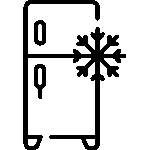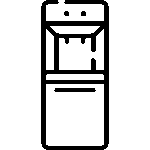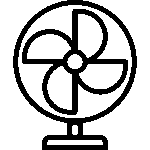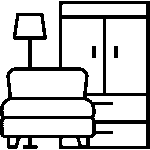The Ultimate Guide to Buying Air Conditioners in Nigeria (2025)
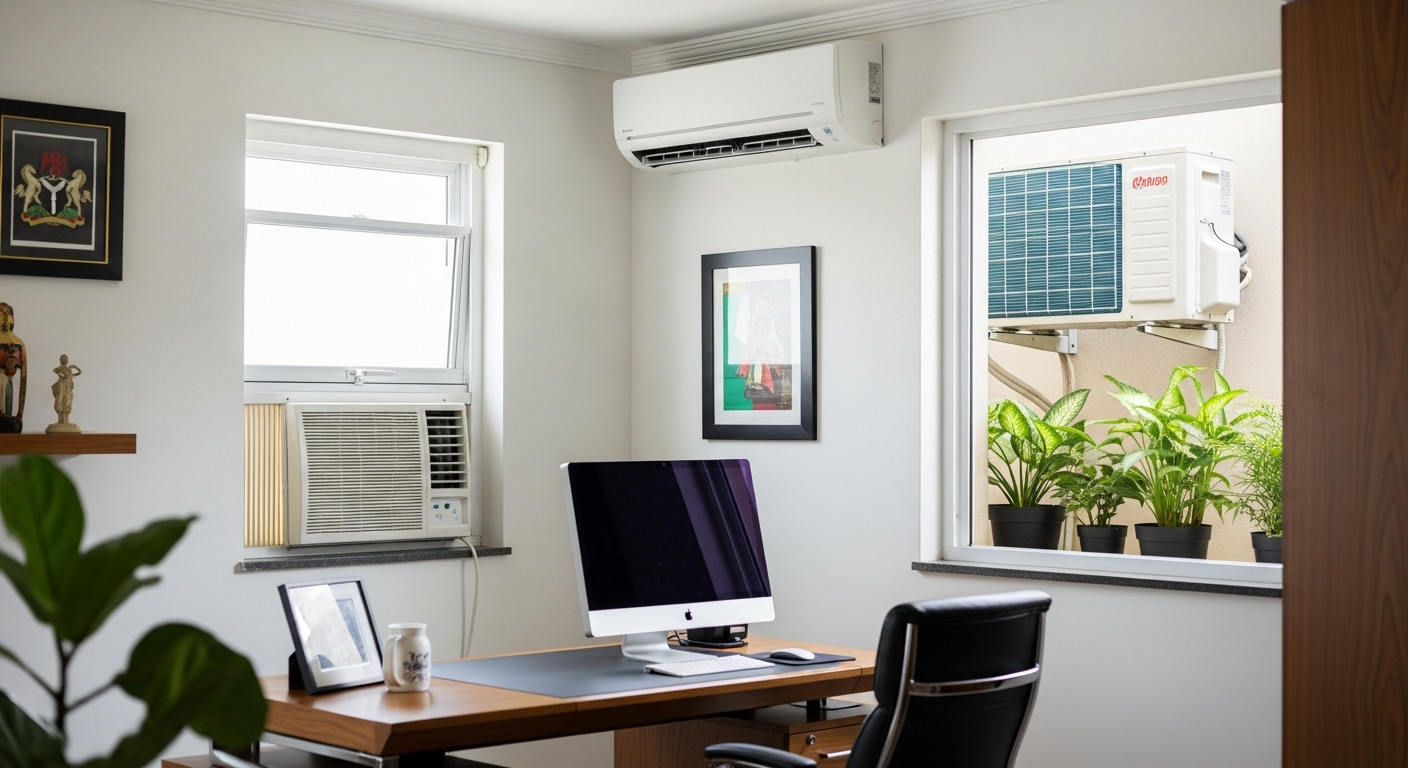
Table of Contents
Introduction
Two weeks ago, my friend Kemi finally decided to escape Abuja’s heat by buying her first air conditioner. She walked into a showroom at Wuse Market, saw a “1.5HP” AC for ₦180,000, and was told it would “cool any room perfectly.” The salesperson assured her it was energy-efficient and would work with her small generator.
Fast forward to today: Kemi’s AC barely cools her medium-sized bedroom, her electricity bill has tripled, and her 2.5KVA generator can’t even start the unit. What she thought was a solution to Nigeria’s heat has become an expensive source of frustration and regret.
“I wish I had understood what 1.5HP means,” she told me while using a standing fan in her bedroom. “Nobody explained that my room size, ceiling height, and number of windows would affect how well it works. Now I’m stuck with an AC that’s too small for my space and too big for my power supply.”
Kemi’s story repeats itself thousands of times across Nigeria every month. Families and businesses invest significant money in air conditioners that either can’t handle Nigerian heat effectively, consume more power than anticipated, or fail prematurely due to voltage fluctuations and poor installation.
But here’s what Kemi didn’t know – and what I’m about to share with you: Let’s be blunt: the heat in Nigeria can be merciless. An Air Conditioner (AC) isn’t just about luxury; it’s about sanity. It’s the difference between a good night’s sleep and a sweaty, restless one. It’s how you stay productive in a stuffy office. But buying an AC is a high-stakes game. Make the wrong choice, and you’re stuck with a unit that can’t cool your room, or worse, one that doubles your “NEPA” bill and drains your generator’s fuel tank.
You hear terms like “Inverter,” “BTU,” and “horsepower,” and it’s easy to get confused by a salesperson’s pitch. You just want to know which one will cool your room without giving you a heart attack when the bills arrive.
Buying the right air conditioner for Nigeria isn’t about choosing the cheapest option or the most popular brand. It’s about understanding your specific cooling needs, matching AC capacity to your room characteristics, and selecting equipment that can thrive in our challenging electrical and climate conditions.
Whether you’re tired of sleepless nights in Nigerian heat, setting up a comfortable office space, or upgrading from an inadequate cooling solution, this guide will help you choose an air conditioner that delivers reliable comfort for years to come.
Understanding AC Types
1. Split Unit AC
This is the one you see everywhere, with an indoor unit that blows the cold air and an outdoor unit that houses the compressor. This is the best choice for 99% of Nigerian homes and offices. It’s the most efficient, offers the best cooling, is significantly quieter, and looks much better. All modern technology, such as inverters, is found in split units.
Advantages of a Split AC
- More powerful cooling capacity than window units of the same energy rating
- Better air distribution through adjustable louvers and fans
- Quiet operation with compressor unit placed outside
- Advanced features like timer, sleep mode, and temperature control
- Installation Flexibility: Can be installed in any room regardless of window size or type
- Indoor unit can be positioned for optimal air circulation
- No need to modify window structure significantly
- Energy Efficiency Advantages: Generally more energy efficient than window ACs
- Inverter technology is widely available in split AC models to reduce power consumption
Split AC Considerations
- Higher initial cost: ₦300,000 – ₦500,000+ depending on capacity and features
- Installation complexity: Requires professional installation with refrigerant lines
- Installation cost: Additional ₦15,000 – ₦30,000 for proper installation
- Space requirements: Need adequate space for both indoor and outdoor units
2. Window Unit AC
An older, all-in-one box unit that fits into a window or a hole in the wall. They are cheaper to buy but are much noisier, less energy-efficient, and an outdated technology. They are only a budget option if you absolutely cannot afford a split unit. They remain popular for specific Nigerian applications despite limitations.
Window AC Advantages
- Cost Effectiveness (very cheap)
- Simpler installation process (All components in one unit reduces complexity)
- Good option for rental properties or temporary installations
- Self-Contained System, hotels
- No refrigerant lines to install or maintain
- Less risk of refrigerant leaks during installation
- Easier to relocate if moving homes
- Simpler troubleshooting and repair process
Window AC Limitations
- Noise levels: Compressor in the same unit creates more indoor noise
- Window requirements: Needs suitable window size and structure
- Security concerns: May compromise window security
- Efficiency limitations: Generally less efficient than equivalent split units
- Heat generation: Some heat from outdoor components affects indoor cooling
3. Portable AC
Portable air conditioners offer a convenient, plug-and-play solution with complete mobility, making them ideal for specific niches in the Nigerian market, particularly for rental spaces or temporary cooling needs.
Portable AC Advantages
- No installation required: Plug and play operation
- Complete mobility: Move between rooms as needed
- Rental-friendly: No permanent installation modifications
- Trial capability: Test cooling needs before permanent installation
Portable AC Limitations
- Lower efficiency: Generally less efficient than split or window units
- Higher operating costs: More electricity consumption for the same cooling
- Noise levels: All components in the same unit create noise
- Space requirements: Takes up floor space in room
- Ventilation needs: Requires window or wall opening for hot air exhaust
- Limited availability: Few models available in the Nigerian market
4. Ceiling Unit AC
These units are designed to be installed directly into the ceiling, providing a sleek and space-saving cooling solution. They’re often used in commercial and residential settings, offering efficient cooling and a discreet design. Ceiling-mounted ACs can be a great option for rooms with limited wall space or for achieving a minimalist aesthetic.
Advantages of Ceiling Unit
- Sleek Design: Installed directly into the ceiling, providing a space-saving solution
- Efficient Cooling: Distributes cooled air evenly throughout the room
- Quiet Operation: Often designed to operate quietly, reducing noise disturbance
- Multi-Directional Airflow: Some models offer adjustable louvers for customized airflow
- Space-Saving: Ideal for rooms with limited wall space or for achieving a minimalist aesthetic
- Aesthetically Pleasing: Blends seamlessly into the ceiling, enhancing room decor
- Flexibility: Suitable for various room layouts and sizes
Limitations
- Installation Challenges: Requires professional installation and may involve complex ductwork
- Higher Upfront Cost: Typically more expensive than other AC types, especially for installation
- Maintenance Access: Can be difficult to access and maintain, potentially increasing maintenance costs
- Limited Suitability: May not be suitable for rooms with very high ceilings or specific architectural designs
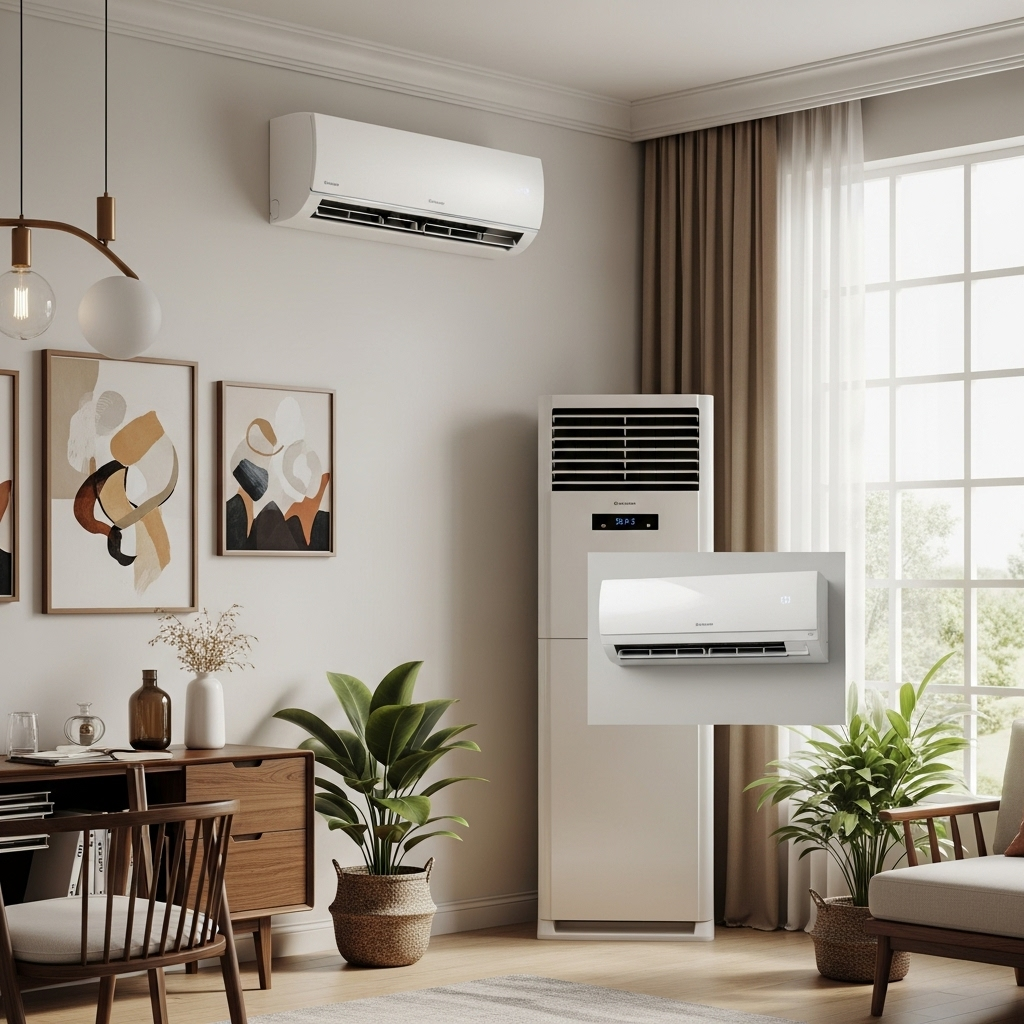
Understanding Cooling Capacity (HP/BTU)
The confusion between horsepower (HP) and BTU (British Thermal Units) leads to many poor AC purchases in Nigeria.
Horsepower vs BTU Explained
| Measurement | What It Measures | Importance |
|---|---|---|
| Horsepower (HP) | Measures compressor motor power, not cooling capacity | Nigerian market habit: Often advertises HP |
| BTU (British Thermal Units) | Actual measure of cooling capacity per hour | True cooling capacity depends on BTU |
Conversion Guide
| HP Rating | BTU Range | Room Application |
|---|---|---|
| 0.75HP | 6,000-9,000 BTU | Very small rooms |
| 1HP | 9,000-12,000 BTU | Small bedrooms |
| 1.5HP | 12,000-18,000 BTU | Medium rooms |
| 2HP | 18,000-24,000 BTU | Large rooms |
| 2.5HP+ | 24,000+ BTU | Very large spaces |
This is critical. An undersized AC will run forever without cooling your room, while an oversized one will cool too quickly and switch off, leading to poor humidity control and wasted energy.
Simple Guide for Room Sizes
For a Small Bedroom or a Small Office (e.g., 10-16 sq. meters), you need: 1.0 HP (approx. 9,000 BTU)
For a Standard Master Bedroom or a Medium-Sized Living Room/Office (e.g., 17-25 sq. meters), you need: 1.5 HP (approx. 12,000 BTU)
For a Large Living Room (“Parlour”) or a Large Open-Plan Office (e.g., 26-40 sq. meters), you need: 2.0 HP (approx. 18,000 BTU)
Energy Efficiency
When choosing an air conditioner, it’s crucial to consider not only the comfort it provides but also the impact on your electricity bill. Traditional ACs can consume a significant amount of energy, especially if they run continuously.
To minimize costs, consider the following factors:
- Energy Efficiency: Look for ACs with high Energy Efficiency Ratings (EER) or Inverter technology, which can help reduce energy consumption
- Power Consumption: Check the AC’s power consumption in watts and estimate your electricity bill based on your usage patterns
- Compatibility with Power Sources: If you plan to use a generator or solar power, ensure the AC is compatible and can run efficiently with these power sources
By considering these factors, you can enjoy a comfortable and cool environment while keeping your electricity bills manageable.
Inverter vs Non-Inverter Technology
The choice between inverter and non-inverter ACs significantly impacts electricity costs and performance in Nigeria.
How Inverter ACs Work:
- Variable speed compressor adjusts to cooling demand
- Maintains steady temperature rather than on/off cycling
- Reduces power consumption by 30-50% compared to non-inverter
- Provides more stable cooling and longer equipment life
Benefits for Nigerian Conditions:
- Lower electricity bills: 30-50% reduction in power consumption
- Voltage tolerance: Better handling of voltage fluctuations
- Generator compatibility: Lower startup power requirements
- Quieter operation: Less compressor cycling noise
- Faster cooling: Variable speed allows rapid temperature reduction
Inverter AC Limitations:
- Higher initial cost: ₦40,000-80,000 premium over non-inverter
- Complex electronics: More sensitive to poor power quality
- Repair complexity: Requires specialized technicians for major repairs
When Non-Inverter Makes Sense:
- Lower initial budget: 30-40% cheaper than inverter models
- Simple technology: Easier and cheaper to repair
- Occasional use: If AC runs less than 4 hours daily
- Stable power areas: Where voltage fluctuations are minimal
Non-Inverter (Fixed Speed) ACs: When it comes to speed cooling, non-inverter ACs are special
Non-Inverter Limitations:
- Higher operating costs: 40-60% more electricity consumption
- Higher startup power: May require larger generator
Durability
When selecting an air conditioner in Nigeria, consider the following essential features to ensure optimal performance and durability:
Key Durability Features
Low Voltage Operation: ACs that can operate within a wide voltage range (e.g., 160V-270V) can handle Nigeria’s unstable power supply, reducing the risk of damage.
Dust Filters: Easy-to-clean dust filters protect the AC’s internal components and ensure clean air circulation, which is crucial in Nigeria’s dusty environment.
Corrosion Protection: Anti-corrosion or gold fin coatings on the outdoor unit can prevent rust and extend the unit’s lifespan, especially in humid and rainy conditions.
By prioritizing these features, you can enjoy efficient and reliable cooling performance, even in Nigeria’s challenging environmental conditions.
Brand Selection
When purchasing an air conditioner, it’s essential to consider the brand’s after-sales support. A brand with good after-sales support can provide:
What Good After-Sales Support Includes:
- Prompt Service: Quick response to service requests and repairs
- Qualified Technicians: Skilled technicians who can diagnose and fix issues efficiently
- Availability of Spare Parts: Easy access to genuine spare parts for repairs
When selecting a brand, research their customer service reputation, warranty offered, and availability of authorized service centers. This can ensure a hassle-free experience and minimize downtime when issues arise.
List of Popular Brands with Good After-Sales Services
LG: A market leader in Nigeria. Their Inverter ACs are incredibly efficient and durable. They have a massive service network across the country, making them a top choice for reliability and support.
Haier Thermocool: Built with Nigeria in mind. Their units are known to be very rugged and handle our power conditions well. They also have a very strong after-sales presence.
Samsung: Offers stylish and powerful Inverter ACs with great energy-saving features. They have a solid reputation and good service centers in major cities.
Hisense: These brands offer fantastic value, providing reliable Inverter technology and good durability at very competitive prices. Other good options are (skyrun, nexus, maxi, media).
How to Identify Original AC
Protection Against Counterfeits
Buy ONLY from Authorized Dealers: This is the golden rule. Go to the brand’s official showrooms (like Fouani for LG) or major, reputable retail chains and online retailers like Dispasal, Jumia, Konga.
Insist on a Valid Manufacturer’s Warranty: When purchasing a product, ensure it comes with a proper warranty card, usually found inside the packaging box. To verify authenticity and activate the warranty, register your product on the brand’s official website. This step confirms the product’s genuineness and provides you with warranty coverage for repairs or replacements as specified by the manufacturer.
Check the Packaging: The box should be high-quality, with clear printing and no spelling mistakes. The model number on the box should match the one on the indoor and outdoor units.
Installation
When installing a new air conditioner, it’s crucial to hire a qualified and experienced installer to avoid potential issues. A bad installation can lead to:
Risks of Poor Installation:
- Reduced Performance: Up to 30% decrease in cooling efficiency
- Voided Warranty: Improper installation can invalidate the manufacturer’s warranty
- Poor Air Quality: Inadequate installation can lead to air leaks, contamination, or other issues
Ensure Quality Installation:
Use Authorized Installers: Always use technicians who are certified by the brand you bought. Your seller should provide this service.
Proper Vacuuming: The installer must use a vacuum pump to remove all air and moisture from the copper pipes before releasing the gas. Skipping this step will kill your compressor over time.
Correct Pipe Length: Ensure the copper pipe connecting the indoor and outdoor units isn’t too long or sharply bent, as this affects performance.
Frequently Asked Questions (FAQs)
Which AC is best for low-voltage areas?
You need an Inverter AC from a reputable brand like LG or Haier Thermocool that specifically advertises Low Voltage Operation or a wide voltage range. This is designed for the unstable power grid in Nigeria.
What is the best AC for an office or a small bedroom?
For a Small Bedroom: A 1.0 HP Inverter AC is perfect. It’s quiet, super-efficient, and will cool the room without freezing you.
For an Office: A 1.5 HP or 2.0 HP Inverter AC is ideal, depending on the size.



